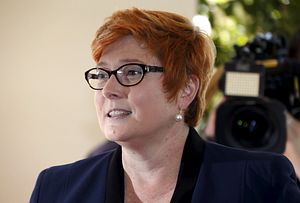Australia not only has a new prime minister, in what Taiwanese animators have called the “revolving door of Australian politics,” but a new defense minister. That portfolio has, at times, revolved so swiftly the centrifugal force could power a fairground.
Since January 2006 Australia has had ten defense ministers, serving an average of a year to under two years. Stephen Smith, under both Rudd and Gillard lasted four days past three years. David Johnson, a year and a third, lost the job after saying he wouldn’t trust the Australian Submarine Corporation to “build a canoe.” He was replaced by Kevin Andrews who has now been succeeded by Marise Payne, the first woman to hold the portfolio.
Save for foreign editor Greg Sheridan, at The Australian, this reshuffle has been greeted with surprise, yes, but general approval. Though a quiet senator from New South Wales, Payne is considered competent, conscientious, and has a strong interest in defense and has served on foreign affairs committees in the past. She has been welcomed over at the Australian Strategic Policy Institute and heralded in mainstream press, too.
However this is a momentous time for defense, Sheridan was right about that. Australia has committed to bombing ISIS in Syria as part of the U.S.-led efforts (at a time when Russia has thrown in for Assad, complicating matters), there is a white paper to be delivered, which she has had no part in writing, there is a decision on whether to build a new submarine fleet in Australia either partially, totally, or at all, and a decision to be made between competitive evaluation process competitors Japan, France and Germany. And will Australia’s defense budget be increased to two percent of GDP? Exciting times.
So, what’s her policy direction?
Payne has refused to publicly speculate on any submarine decision. (It is important to note she is from New South Wales and not a state with a stake in ship or submarine building.) She believes ISIS to be a serious threat “who are intent upon disrupting Western democracies’ ways of life.” Generally, Payne seems to share the PM’s foreign policy direction.
South China Sea
In one of his first interviews on policy and foreign policy, Malcolm Turnbull devoted the main part of his foreign policy and defense talk to China’s actions in the South China Sea.
The first part was not particularly incendiary: “I think at a – in terms of our region, what we need to ensure is that the rise of China, which is happening, it’s – nothing’s gonna stop that any time soon – is, if you like, conducted in a manner that does not disturb the security and the relative harmony of the region upon which China’s prosperity depends.”
But he then went on to say China had been “pushing the envelope” and that it was “one of the more counterproductive strategies undertaken by China’ as it had, essentially, forced more of a U.S. presence in the region and forced other nations closer to the U.S., which may not necessarily otherwise have happened, for instance in the case of Vietnam. Island building, he stated, is a problem.
It’s a bit of a departure for Turnbull, who earlier had found the threat of China to be overstated. Beijing’s reaction, via Foreign Ministry Hong Lei, was to say it hoped Australia would not take sides and it wished to resolve issues bilaterally, something other claimants of the Spratly and Paracel Islands don’t want. For Beijing it may have seemed a muted response, especially considering some of the invective that can show up in the nationalist Global Times. However, Turnbull was stating a position widely held across the region and internationally, and something not especially at odds with Opposition Leader Bill Shorten who has also called for a multilateral ASEAN resolution (though has been more muted on China’s actual actions and aggression).
Payne backs her prime minister, saying, “I heard the prime minister’s remarks last night, and I know he’s spoken about this earlier in the year, for example, in a speech he gave on this issue, and I think his remarks were very considered; I would have no difference with those remarks.”

































